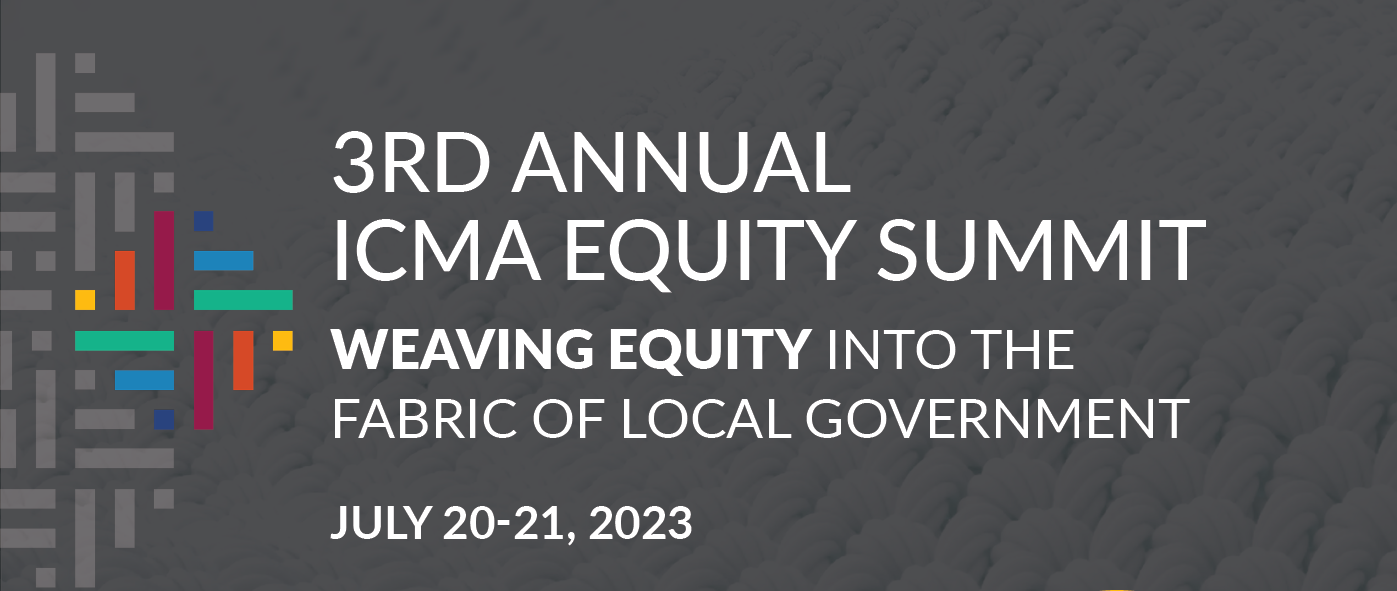Artifact 5
Diversity, Equity, Inclusion, and Belonging
About ICMA
The 2023 ICMA Equity Summit will be a virtual gathering of Diversity, Equity, and Inclusion Officers (and those doing the work without the title) as well as local government professionals interested in ideas and institutions to deepen strategies, shape actions, and create solutions. Throughout two days and two tracks, this event will create and foster relationships with like-minded professionals, as well as cover best practices, ideas and innovations in the DEIB space and local government management profession.
Attendees can expect inspiration and encouragement to help weave the fabric of equity into their local government operations. You'll have the opportunity to create and maintain relationships with like-minded professionals, as well as foster these relationships in a virtual environment.
Narrative
In July of 2023, the International City/County Management Association (ICMA) hosted its annual Equity Summit, a two-day virtual” gathering of Diversity, Equity, and Inclusion Officers (and those doing the work without the title) as well as local government professionals interested in ideas and institutions to deepen strategies, shape actions, and create solutions” (icma.org). After submitting a proposal to the committee coordinating the event, I was selected to host a workshop covering the topic of Burnout and Retention in the DEIB space. I was able to align my knowledge of leadership development to the topic of the summit and facilitate the generation and collaboration of thought leaders to benefit city government external communities and internal organizations (DEL Outcome 3). Collazos et. al (2002) suggested that collaborative learning requires not only the learning of the subject matter but learning how to effectively manage interactions or learning to collaborate. This is especially significant when utilizing digital formats as traditional methods of learning that might have taken place in-person in previous years are now adapting to virtual constructs. Leaders who hope to continue to reach wider audiences to collaborate with should also learn to adapt with these changes.
To create the workshop, I assessed current research and practices to compile an hour-long presentation of research intermingled with collaboration from the 100+ participants that also addressed the complexity that leadership possesses in terms of relationships and their unpredictable elements (Gurr & Drysdale, 2020). While the focus of the workshop was to center on DEIB practitioners, their common friction points, and ways to ‘move the needle’ towards a more equitable and sustainable practice, I was able to weave segments of leader development and how participants should utilize the knowledge shared to enhance their own understanding of burnout but to use it to inform their own organizations (leadership development). (DEL Outcome 6). Moldoveanu & Narayandas (2019) acknowledged the recognition of the need for leadership development amongst an over-saturated market of available sources to provide training which brings forth the difficulty for a development professional like me to gain a foothold in the market. Virtual constructs have assisted in the creation and ability to reach larger audiences and make the education repeatable and sustainable over time. Servant leadership was also a prominent theme and takeaway for the participants as knowledge creation and evaluation occurred.
Overall, I facilitated a space for DEIB practitioners in city government to view various perspectives of individuals from diverse backgrounds and critically assess their own understanding and execution of their role not just as managers, but as leaders.
DEL OUTCOMES
3. Assemble, align, and reconfigure tangible and intangible assets to sustain organizations’, communities’, or institutions’ viability for the future.
5. Assess existing research and practices and design, conduct, and interpret research to contribute to the theory and practice of leadership within one’s discipline and in interdisciplinary, multidisciplinary, or transdisciplinary contexts.
6. Generate and critically evaluate new knowledge, conserve the most important ideas and findings that are a legacy of past and current work and engage in the transformational work of communicating knowledge responsibly to others.







